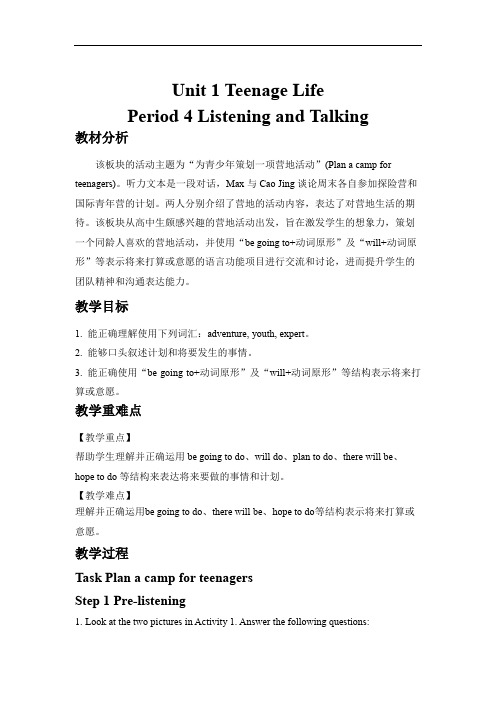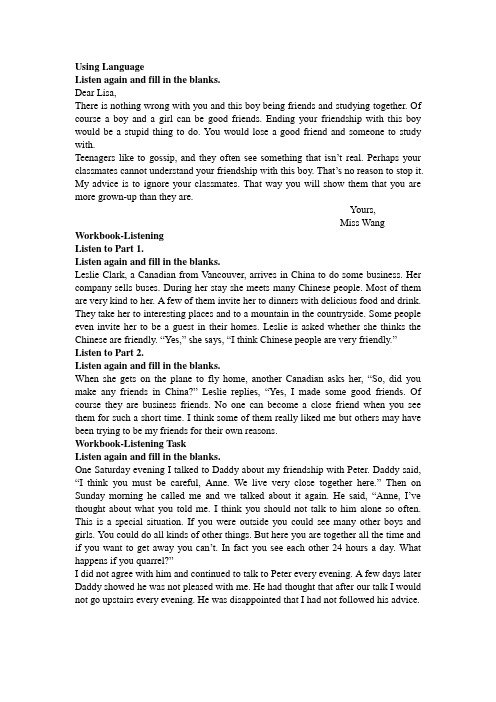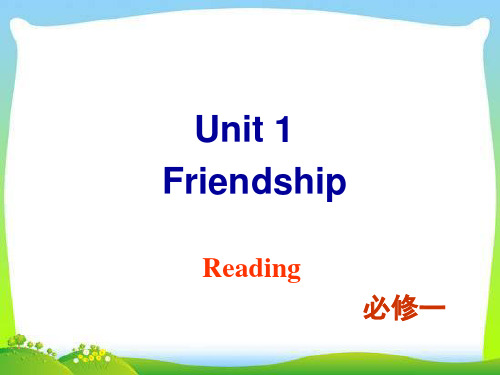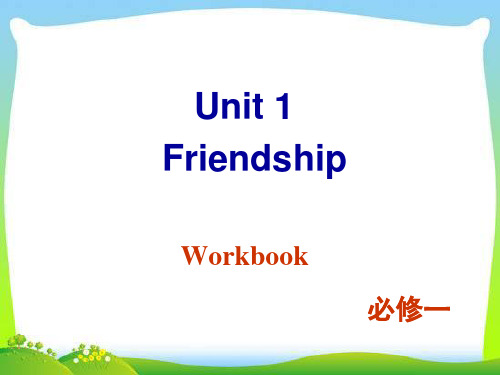人教新课标高中英语必修1教学课件:Class activities(1)
Discovering Useful Structures PPT课件(人教英语高一必修1册)

5. What did your adviser say about the advanced literature course? My adviser said that the advanced literature course was too difficult but very interesting.
高中英语
4. Linda thinks and speaks quite quickly, AdvP 状语
and she can do well in the debate. NP 宾语
高中英语
5. The new coach told me that I didn’t play well enough.
As to extra-curricular activities, he didn’t play football well enough, but he won’t quit and he will find a way to improve so that he can make the team.
高中英语
1. The students will do group discussions, timed writing, and research in the advanced literature course.
高中英语
1. The students will do group discussions, timed writing, and research in the advanced literature course. group discussions, NP, 作宾语 the advanced literature course, NP,作宾语
人教版高中英语选择性必修第一册教学课件UNIT1 Learning About (课件PPT)

Hundreds of thousands of lives are thought to be saved by Artem isinin, which
A nonrestrictive clause describes a noun or a sentence in a nonessential way,giving extra information, an explanation, or a comment on a noun or a sentence.
● 6. I was asked to explain the project with the help of a flow chart. It was a big challenge for me.
● _I_w__as__a_sk_e_d_t_o_e_x_p_l_ai_n_t_h_e_p_r_o_je_c_t_w_i_th__th_e_h_e_l_p_o_f_a__fl_o_w_c_h_a_rt_,__w_h_i_c_h_w_a_s_a__b_ig___________ _c_h_a_lle_n_ge for me.
Non-restrictive
subject
Nobel Prize
3
Hainan
Non-restrictive
adverbial
Give extra information about Hainan
4
malaria patients
Give extra information about
英语人教版高中必修一(新课标)教案Unit1 Listening and Talking 教案

Unit 1 Teenage LifePeriod 4 Listening and Talking教材分析该板块的活动主题为“为青少年策划一项营地活动”(Plan a camp for teenagers)。
听力文本是一段对话,Max与Cao Jing谈论周末各自参加探险营和国际青年营的计划。
两人分别介绍了营地的活动内容,表达了对营地生活的期待。
该板块从高中生颇感兴趣的营地活动出发,旨在激发学生的想象力,策划一个同龄人喜欢的营地活动,并使用“be going to+动词原形”及“will+动词原形”等表示将来打算或意愿的语言功能项目进行交流和讨论,进而提升学生的团队精神和沟通表达能力。
教学目标1. 能正确理解使用下列词汇:adventure, youth, expert。
2. 能够口头叙述计划和将要发生的事情。
3. 能正确使用“be going to+动词原形”及“will+动词原形”等结构表示将来打算或意愿。
教学重难点【教学重点】帮助学生理解并正确运用be going to do、will do、plan to do、there will be、hope to do等结构来表达将来要做的事情和计划。
【教学难点】理解并正确运用be going to do、there will be、hope to do等结构表示将来打算或意愿。
教学过程Task Plan a camp for teenagersStep 1 Pre-listening1.Look at the two pictures in Activity 1. Answer the following questions:(1)What kind of camp is Adventure Camp/International Youth Camp?(2)What activities will it include?(3)What can students learn in these activities?2.Read the sentences in Activity 1. Then predict the main idea of the conversation. Step 2 While-listening1. Work on Activity 1. Listen to the conversation and tick what are heard about the camps.2.Work on Activity 2. Underline the expressions in the sentences above that Cao Jing and Max use to talk about the future.设计意图:该环节让学生通过勾画听力文本中的目标结构,关注对话中如何表达将来要做的事情和计划。
人教新课标高中英语必修1教学课件:U1 听力原文

Using LanguageListen again and fill in the blanks.Dear Lisa,There is nothing wrong with you and this boy being friends and studying together. Of course a boy and a girl can be good friends. Ending your friendship with this boy would be a stupid thing to do. You would lose a good friend and someone to study with.Teenagers like to gossip, and they often see something that isn’t real. Perhaps your classmates cannot understand your friendship with this boy. That’s no reason to stop it. My advice is to ignore your classmates. That way you will show them that you are more grown-up than they are.Yours,Miss Wang Workbook-ListeningListen to Part 1.Listen again and fill in the blanks.Leslie Clark, a Canadian from Vancouver, arrives in China to do some business. Her company sells buses. During her stay she meets many Chinese people. Most of them are very kind to her. A few of them invite her to dinners with delicious food and drink. They take her to interesting places and to a mountain in the countryside. Some people even invite her to be a guest in their homes. Leslie is asked whether she thinks the Chinese are friendly. “Yes,” she says, “I think Chinese people are very friendly.”Listen to Part 2.Listen again and fill in the blanks.When she gets on the plane to fly home, another Canadian asks her, “So, did you make any friends in China?” Leslie replies, “Yes, I made some good friends. Of course they are business friends. No one can become a close friend when you see them for such a short time. I think some of them really liked me but others may have been trying to be my friends for their own reasons.Workbook-Listening TaskListen again and fill in the blanks.One Saturday evening I talked to Daddy about my friendship with Peter. Daddy said, “I think you must be careful, Anne. We live very close together here.” Then on Sunday morning he called me and we talked about it again. He said, “Anne, I’ve thought about what you told me. I think you should not talk to him alone so often. This is a special situation. If you were outside you could see many other boys and girls. You could do all kinds of other things. But here you are together all the time and if you want to get away you can’t. In fact you see each other 24 hours a day. What happens if you quarrel?”I did not agree with him and continued to talk to Peter every evening. A few days later Daddy showed he was not pleased with me. He had thought that after our talk I would not go upstairs every evening. He was disappointed that I had not followed his advice.。
《英语》(新标准)高中修订版必修第一册Unit 1 教学设计

单元主题
本单元主题语境是“人与自我”,涉及的主题语境内容是高中起始阶段的日常学习与生活。本单元从介绍一所英国中学里学生的日常学习生活开始,依次呈现了中国男孩孟浩高中生活的第一天、学校里不同的俱乐部、美国女孩Lisa总结的高中学习与生活建议等学习内容,帮助学生全面了解高中日常学习与生活的基本情况,使学生意识到初、高中学习生活的不同,引导学生合理规划、安排高中生活,并在一定程度上了解中外学校高中教育的异同。
1. Ss complete Activity 3. They can read the passage again if necessary.
2. Ss share their answers and give the reasons.
Train students’ readingskills of getting the main idea.
教学难点
引导学生根据文本和图片准确理解孟浩的经历和情感,并总结出其情感变化。
教学策略
任务型教学法、P–W–P阅读模式
Teaching contents
Procedures
Purposes
Teacher’s activity
Students’activity
Activity 1
1.T asks Ss to tick the topics they’d like to include in their own diaries in Activity 1.
Activity 2
1.T asks Ss tocompletethequestionnaire.
2.T asks Ss to choose one or several issues to share with the class.
新人教版高中英语必修一 Unit 1 Reading教学课件

1929 born in Germany
1933 Moved to Amsterdam
From 1940 Hidden in a building for two years, writing diary
1944 discovered and killed the next year
2. What is an ordinary diary like according to Anne? What about her diary? According to Anne, an ordinary diary is where most people like to set down a series of facts. But Anne wrote down her deepest feelings and thoughts in her diary. She told everything to her best friend - her diary.
Skimming
Skim the passage fast to get the main idea of the diary. her feelings about nature • Anne expressed ______________________ after hiding for a long time. about nature kept Anne • Everything _____________________ spellbound. spellbound--means to concentrate with delight for some time.
人教课标版高中英语必修1Unit1_写作课_公开课课件(共13张PPT)

interest in other people’s ideas
them see you are friendly
to ask for help from your teachers to build up your confidence.
to help others as possible as you can to communicate with them better
have a problem. I am not very good at communicating
•with people. He finds it hard to with people. Although I try to talk to my classmates, I
still find it hard to make good friends with them. So I feel quite lonely sometimes. I do want to
I hope you will find these ideas useful.
Task 4 write and show
Task 5
Homework:
1. Students will be asked to swap their letter with their group members and check for mistakes. 2.Finalize the writing draft and be ready to hand it in.
UNIT1 MODULE 1 Friendship
How to write a letter of advice
No.1 Middle School of Jiyuan Wang Qian
新人教版高中英语必修一 Unit 1 Workbook教学课件

“Yes,” she says, “I think Chinese people are very friendly.”
Part 2
When she gets on a plane to fly home, another Canadian asks her, “So, did you make any friends in China?” Leslie replies, “Yes, I made some good friends. Of course they are business friends. No one can become a close friend when you see them for such a short time. I think some of them really like me. But others may have been trying to be my friends for their own reasons.”
4 Listen to Part 2 and answer the questions: What kind of friends did Leslie make in China? Does she think she can make a close friend in a short time? Leslie made some friends but they are just business friends. She doesn’t think one can make real friends on a short visit.
Useful expressions about agreement and disagreement: I think so. I don’t think so. I agree. I don’t agree. That’s correct. Of course not. Exactly. I’m afraid not.
- 1、下载文档前请自行甄别文档内容的完整性,平台不提供额外的编辑、内容补充、找答案等附加服务。
- 2、"仅部分预览"的文档,不可在线预览部分如存在完整性等问题,可反馈申请退款(可完整预览的文档不适用该条件!)。
- 3、如文档侵犯您的权益,请联系客服反馈,我们会尽快为您处理(人工客服工作时间:9:00-18:30)。
back to the teacher. 4. The teacher then throws the ball to another
them not to show anyone. This word should be a verb (or whatever you'd like to review). 2. The teacher starts telling a story, then stops and chooses a student. 3. That student will continue the story and must use his/her word. This student then chooses the next student to continue the story. 4. The last student must end the story. 5. After the story is over, the students then try to guess what words each student has written on his/her paper. (The student who guesses the most words wins the game.)
roles.
Ball Game Type of Activity: vocabulary Purpose: review vocabulary Procedure: 1. Students stand up in a circle around the
teacher. 2. A ball is tossed to a student and the teacher
Crazy Story Type of Activity: vocabulary and speaking Purpose: make your students speak in class and be
creative Procedure: 1. Ask students to write a word on a piece of paper and tell
必修1
Sentence Race Type of Activity: vocabulary Purpose: review the words’ meanings and usages Procedure: 1. Prepare a list of words. 2. Write each word on two small pieces of paper. That means
writing the word twice, once on each paper. 3. Organize the pieces like bundles, 2 bundles, 2 sets of
identical words. 4. Divide the class into 2 teams. Get them to make creative
keep track of points. 2. Place a desk in the front of the room facing the class, so that someone
sitting it has their back to the board and can't read it. 3. Place another desk in front of it, so the teammates are facing each other. 4. Pick a team to go first, and have them choose a card. 5. Have the teammates decide who will guess and who will talk. 6. The guesser sits with their back to the board. On the board, making sure
team names. 5. Distribute each list of words to both teams. Every student
on each team should have a paper. Both teams have the same words. 6. When you call a word, 2 students should stand up, one from each team. The students must then run to the blackboard and race to write a sentence using their word. (The winner is the one with a correct and clearly written sentence.)
பைடு நூலகம்
without saying it, or any of the other words. 8. After they guess it have another group come up. 9. When all the groups have gone, do it again and have the teammates switch
Taboo Type of Activity: vocabulary and speaking Purpose: practice forming sentences and use words and structures Procedure: (Before class, create several index cards. On each card write one word in a large font with a circle around it, and underneath write 2-4 related words in a smaller font. The goal is for students to get their teammates to guess the circled word. They can say anything they like to try to make them guess, except for the words written on the card.) 1. Divide the class into groups of two, and write each group on the board to
the guesser can't see, write the circled word as well as the other taboo words. 7. The talker then has to try to make their partner guess the circled word
student and asks another question. (For higher levels, you can ask such questions like "Give me the past participle of an irregular verb".)
Guessing Game Type of Activity: vocabulary Purpose: review vocabulary Procedure: Using vocabulary the students have learned recently, prepare some cards with one word written on them. During class, select one of the cards without showing the students what is written on it. The students will try to figure out what the word is by asking questions, which you will answer. They may only ask “yes-no” or “choice type” questions such as: is it something you can eat? Is it made out of paper? Is it a thing or a person? Is it an animal? Can it move? Is it something we can use? The students can guess what is written on the card whenever they think they have enough information. Anyone who guesses right wins a piece of candy or another reward provided by you. Then go to the next card.
